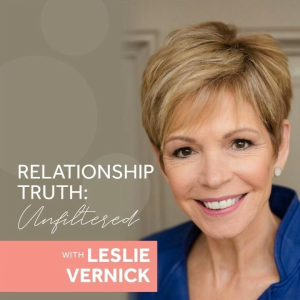
Monday Dec 05, 2022
Is Fear In Charge?
In this episode of Relationship Truth: Unfiltered you’ll hear some of Leslie and Julie’s experiences with the emotion of fear and how it has, at times, been in the driver’s seat of their lives. Leslie will share how fear can be a good thing but also when it becomes detrimental to decision making and living the life God has called you to live.
Notes from this episode:
- Fear can be a good thing. Our bodies warn us of danger and it’s good to heed the body’s warning.
- Fear can also be detrimental when it turns to anxiety and a person lives with the fear of “what if I look foolish, what if something bad happens, what if something bad happens, what if I get rejected…”
- How do you deal with the fear of decision making?
- The first step is to make a decision: The absolute best decision you can make is the right decision. The second best decision you can make is the wrong decision. The worst decision you can make is no decision.
- 9:35 What if you’ve made a decision that isn’t easy to change, like marrying the wrong person?
- Even this can be a good decision if you let it teach you.
- When does fear cross the line to where it’s becoming a detriment?
- When the fear stops a person from growing. When fear drives your decisions. Any emotion you allow in the driver’s seat can be detrimental.
- When we really understand God’s plan for our lives, when something puts us in a scary situation and we are afraid … that may be something where we are to grow and learn.
- What would be a better way of facing those fears?
Face your own internal self talk. Maybe you don’t think you can handle hurt so you live in a bubble. Maybe you need to think about how you can handle hurt or stand up for yourself instead of being a victim.
As the question, “because.” I’m afraid because… and if that happens, what does that mean? “It means… and if that happens, it means…” and so on. It’s a way of getting to the root issue of your story. Maybe the root of it is that you think you’re worthless. - The Bible has more to say about fear than almost anything else. If we really do trust him, that he knows what he’s doing and will work it out for our good, for our maturity, (not necessarily our happiness or pleasure) then we don’t have to live in fear.
- How do you deal with the feelings and fears that come after experiencing something tragic?
- Your emotions aren’t the boss of you. You can get help and support. How can you learn to deal with it? How can you prepare yourself to accept that you will have to deal with it and come to a place of acceptance? You don’t have to lose your mind or sanity.
- One of the biggest ways to conquer fear is to walk toward what you fear. You can face the fears in your mind. If you know you can handle it and there will be resources for you, it’s still unpleasant and hard but knowing you will get through it makes the fear less powerful.
- Don’t transfer an old experience to the present. You aren’t the same person.
- Where do people get support?
- Counseling and coaching support is available. Grief groups or other groups. The most important thing is to know you’re not alone. Being alone can lead to feelings of shame and depression. It doesn’t always have to be professional support. Peer to peer support is also a big help. Once you de-shame having problems it’s very empowering.
- Pay attention to your thoughts.
- Psalm 55:2 My thoughts trouble me and I am distraught. If you struggle with anxiety. Philippians 4:6-8 Be anxious for nothing but in everything let your requests be made known to God and the peace of God which passes all understanding will guard your heart and your mind. And, later, Pau says, Whatsoever things are good and noble and true and just…let your mind dwell on these things.
- You don’t have to think negatively. You can change the channel in your mind. The Bible tells us to discipline ourselves when our mind is focusing on negative and worrisome things. Don’t feed your mind with worst-case scenarios. We have to say, “God, you are in control.”
- How do you go about training yourself to think differently?
- Once you recognize what you’re thinking, that’s when you consciously change the channel. The first step is recognizing your thoughts. So focus on what’s good in your life. What can you be grateful for? Intentionally feed your mind different ways to look at your situation. There is more than one way to look at your situation. Believe that. Be very intentional when it comes to your thoughts and it will start to become more natural.
- God has wired our thoughts to affect your emotions. If they are impacting your emotions in a way that doesn’t match with reality, understand that your body is reacting as though your thoughts are reality.
- We are called to do this. “Take every thought captive to the obedience of Christ.” (2 Cor. 10:5) “Guard your heart for it is the wellspring of life.” (Proverbs 4:23)
You can deal with it. Or you can learn to deal with it. It may be hard. But you can do it. Emotions are our informers. They are not our deciders. Don't just work on your thinking. Work on your virtues as well. This will help you deal with those emotions.
Don’t forget to:
- Sign up for Leslie’s newsletter at www.leslievernick.com
- Register for a free webinar on www.leslievernick.com/joinworkshop
- Share this episode!
2 years ago
💚